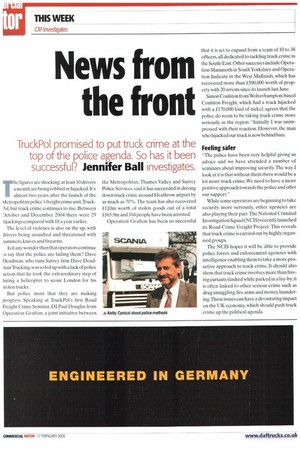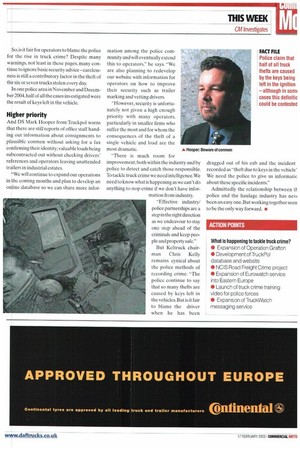News from the front
Page 30

Page 31

If you've noticed an error in this article please click here to report it so we can fix it.
TruckPol promised to put truck crime at the top of the police agenda. So has it been
successful? Jennifer Ball investigates.
The figures are shocking: at least 10 drivers a month are being robbed or hijacked. It's almost two years after the launch of the Vletropolitan police's freight crime unit,TruckPoi, but truck crime continues to rise. Between Dctober and December 2004 there were 29 -fijackings compared with 18 a year earlier.
The level of violence is also on the up, with Jrivers being assaulted and threatened with lammers, knives and firearms.
Is it any wonder then that operators continue to say that the police are failing them? Dave Deadman, who runs Surrey firm Dave Deadman Trucking,was so fed up with a lack of police action that he took the extraordinary step of hiring a helicopter to scour London for his stolen trucks.
But police insist that they are making progress. Speaking at TruckPol's first Road Freight Crime Seminar. DI Paul Douglas from Operation Grafton, a joint initiative between the Metropolitan:Thames Valley and Surrey Police Services, said it has succeeded in driving down truck crime around Heathrow airport by as much as 70%. The team has also recovered £110m worth of stolen goods out of a total £165.9m and 104 people have been arrested.
Operation Grafton has been so successful that it is set to expand from a team of 10 to 38 officers, all dedicated to tackling truck crime in the South-East.Othersuccesses include Operation Mammoth in South Yorkshire and Operation Indicate in the West Midlands, which has recovered more than £500,000 worth of property with 20 arrests since its launch last June.
Simon Coniston from Wolverhampton-based Coniston Freight, which had a truck hijacked with a £170,000 load of nickel, agrees that the police do seem to be taking truck crime more seriously in the region: "Initially I was unimpressed with their reaction. However, the man who hijacked our truck is now behind bars.
Feeling safer
"The police have been very helpful giving us advice and we have attended a number of seminars about improving security. The way I look at it is that without them there would be a lot more truck crime. We need to have a more positive approach towards the police and offer our support."
While some operators are beginning to take security more seriously, other agencies are also playing their part. The National Criminal Investigation Squad (NCIS) recently launched its Road Crime Freight Project. This reveals that truck crime is carried out by highly organised groups.
The NCIS hopes it will be able to provide police forces and enforcement agencies with intelligence enabling them to take a more proactive approach to truck crime. It should also show that truck crime involves more than having curtains slashed while parked in a lay-by; it is often linked to other serious crime such as drug smuggling, fire arms and money laundering.These issues can have a devastating impact on the UK economy, which should push truck crime up the political agenda. So, is it fair for operators to blame the police for the rise in truck crime? Despite many warnings, not least in these pages, many continue to ignore basic security advice-carelessness is still a contributory factor in the theft of the six or seven trucks stolen every day.
In one police area in November and December 2004, half of all the cases investigated were the result of keys left in the vehicle.
Higher priority
And DS Mark Hooper from Truckpol warns that there are still reports of office staff handing out information about consignments to plausible conmen without asking for a fax confirming their identity; valuable loads being subcontracted out without checking drivers' references and operators leaving unattended trailers in industrial estates.
"We will continue to expand our operations in the coming months and plan to develop an online database so we can share more infor mation among the police community and will eventually extend this to operators," he says. "We are also planning to redevelop our website with information for operators on how to improve their security such as trailer marking and vetting drivers.
"However, security is unfortunately not given a high enough priority with many operators. particularly in smaller firms who suffer the most and for whom the consequences of the theft of a single vehicle and load are the most dramatic.
"There is much room for improvement, both within the industry and by police to detect and catch those responsible. To tackle truck crime we need intelligence.We need to know what is happening as we can't do anything to stop crime if we don't have infor mation from industry.
-Effective industry/ police partnerships are a step in the right direction as we endeavour to stay one step ahead of the criminals and keep people and property safe."
But Keltruck chairman Chris Kelly remains cynical about the police methods of recording crime: "The police continue to say that so many thefts are caused by keys left in the vehicles. But is it fair to blame the driver when he has been dragged out of his cab and the incident recorded as "theft due to keys in the vehicle' We need the police to give us informatic about these specific incidents."
Admittedly the relationship between ti police and the haulage industry has nevt been an easy one. But working together seen to be the only way forward. • ACTION POINTS
What is happening to tackle buck crime?
• Expansion of Operation Grafton • Development of TruckPol database and website • NCIS Road Freight Crime project • Expansion of Eurowatch service into Eastern Europe • Launch of truck crime training video for police forces • Expansion of TruckWatch messaging service






























































































































































































